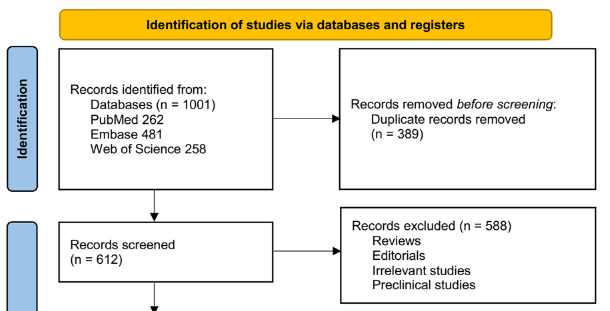Body weight and BMI variability linked to dementia risk: A meta-analysis
DOI:
https://doi.org/10.17305/bb.2025.12626Keywords:
Body weight, Variability, Dementia, Alzheimer’s disease, Risk factorAbstract
Emerging evidence suggests that fluctuations in body weight (BW) or body mass index (BMI), independent of average levels, may influence dementia risk. However, the association between intra-individual variability in BW or BMI and incident dementia remains unclear. This meta-analysis aimed to clarify this relationship. A systematic search of PubMed, Embase, and Web of Science was conducted through March 25, 2025, to identify longitudinal observational studies reporting dementia outcomes in relation to BW or BMI variability. Relative risks (RRs) comparing the highest versus lowest variability categories were pooled using a random-effects model. Subgroup and sensitivity analyses were performed to explore heterogeneity and assess the robustness of the results. Nine cohort studies (10 datasets; 4,232,666 participants) were included. Overall, high BW or BMI variability was associated with a significantly increased risk of dementia (RR = 1.36, 95% CI: 1.27–1.46; p < 0.001; I² = 84%). The association was consistent for both BW (RR = 1.45) and BMI (RR = 1.34) variability. Subgroup analyses showed stronger associations in prospective studies than in retrospective ones, and in studies that did not adjust for baseline BW/BMI compared to those that did (p for subgroup difference < 0.05). Associations remained robust in sensitivity analyses and across dementia subtypes, including Alzheimer’s disease and vascular dementia. No significant publication bias was detected (Egger’s test, p = 0.22). In conclusion, greater intra-individual variability in BW or BMI may be independently associated with increased dementia risk. These findings underscore the importance of maintaining weight stability in mid-to-late life as a potential preventive strategy for dementia.
Citations
Downloads

Downloads
Published
Issue
Section
Categories
License
Copyright (c) 2025 Sitian Fang, Lewei Guan, Huimin Jian, Xijian Dai, Lianggeng Gong

This work is licensed under a Creative Commons Attribution 4.0 International License.









